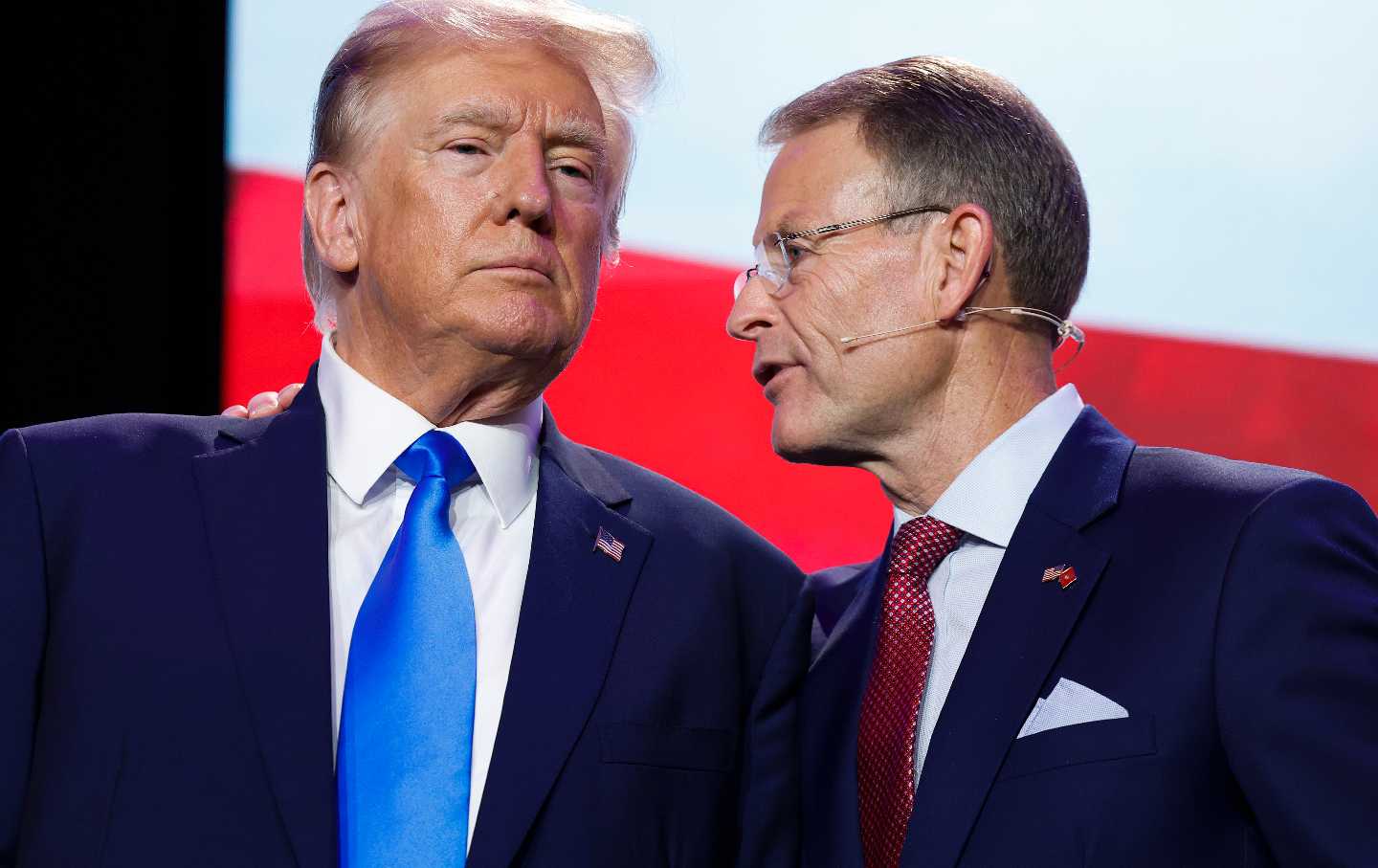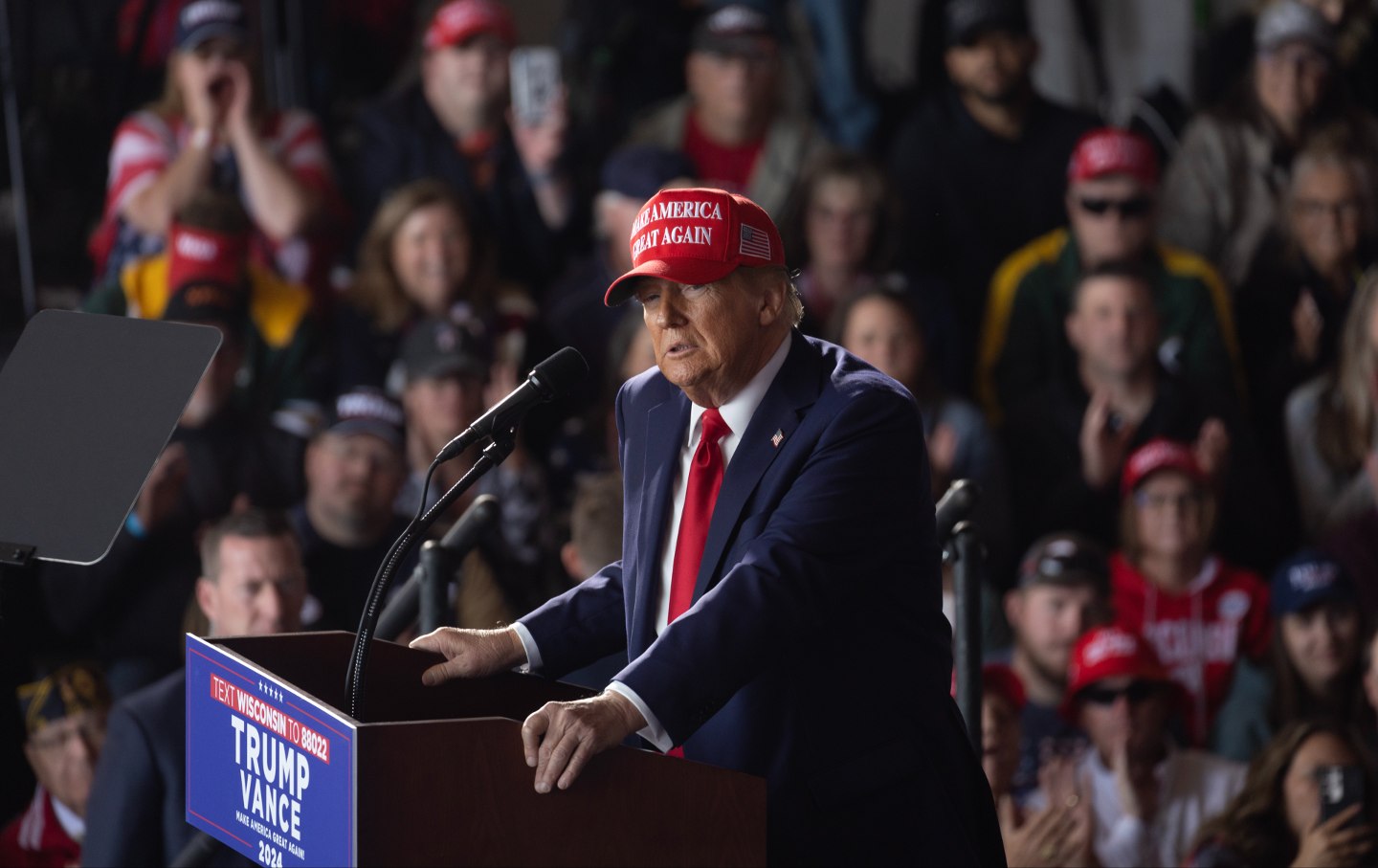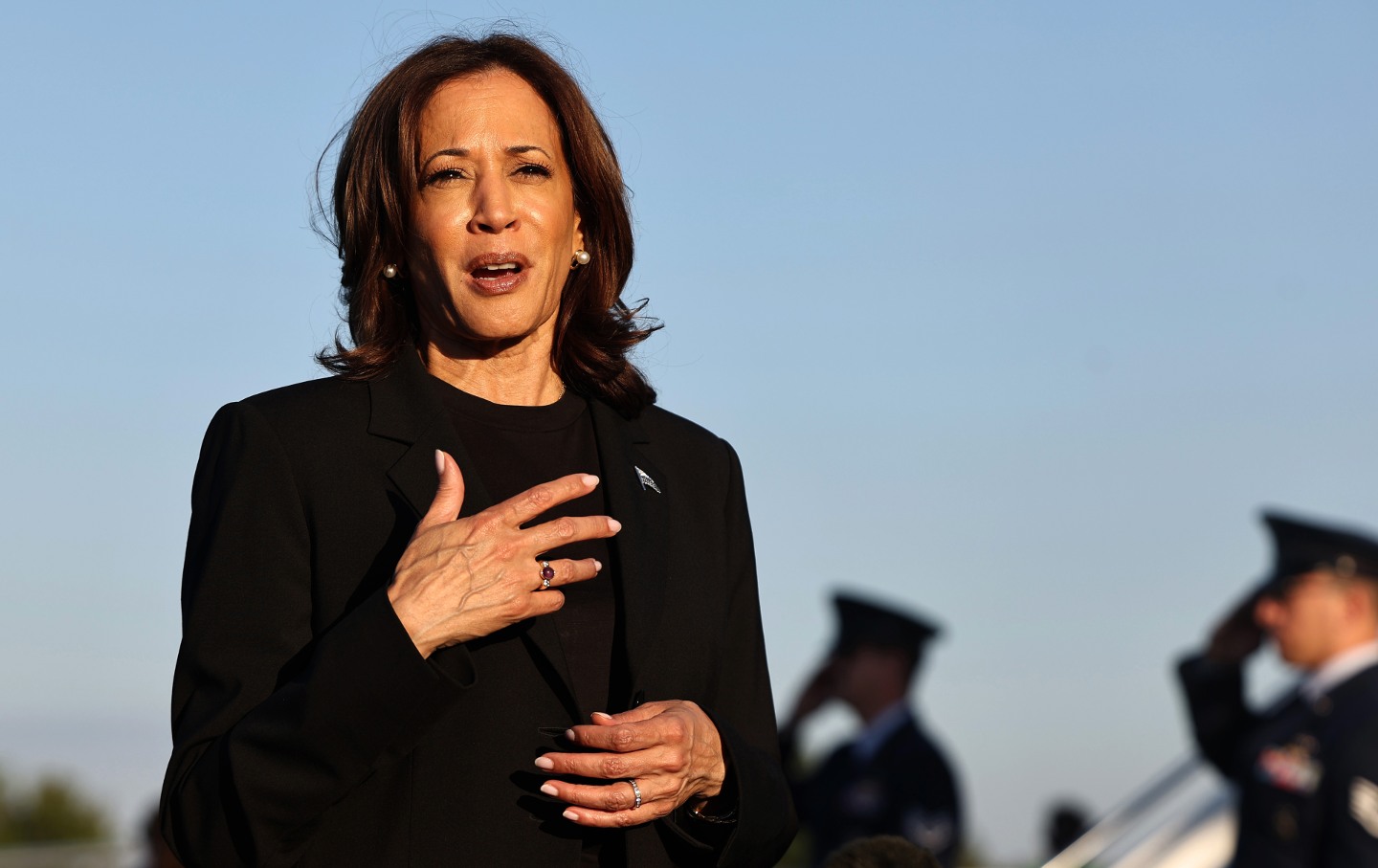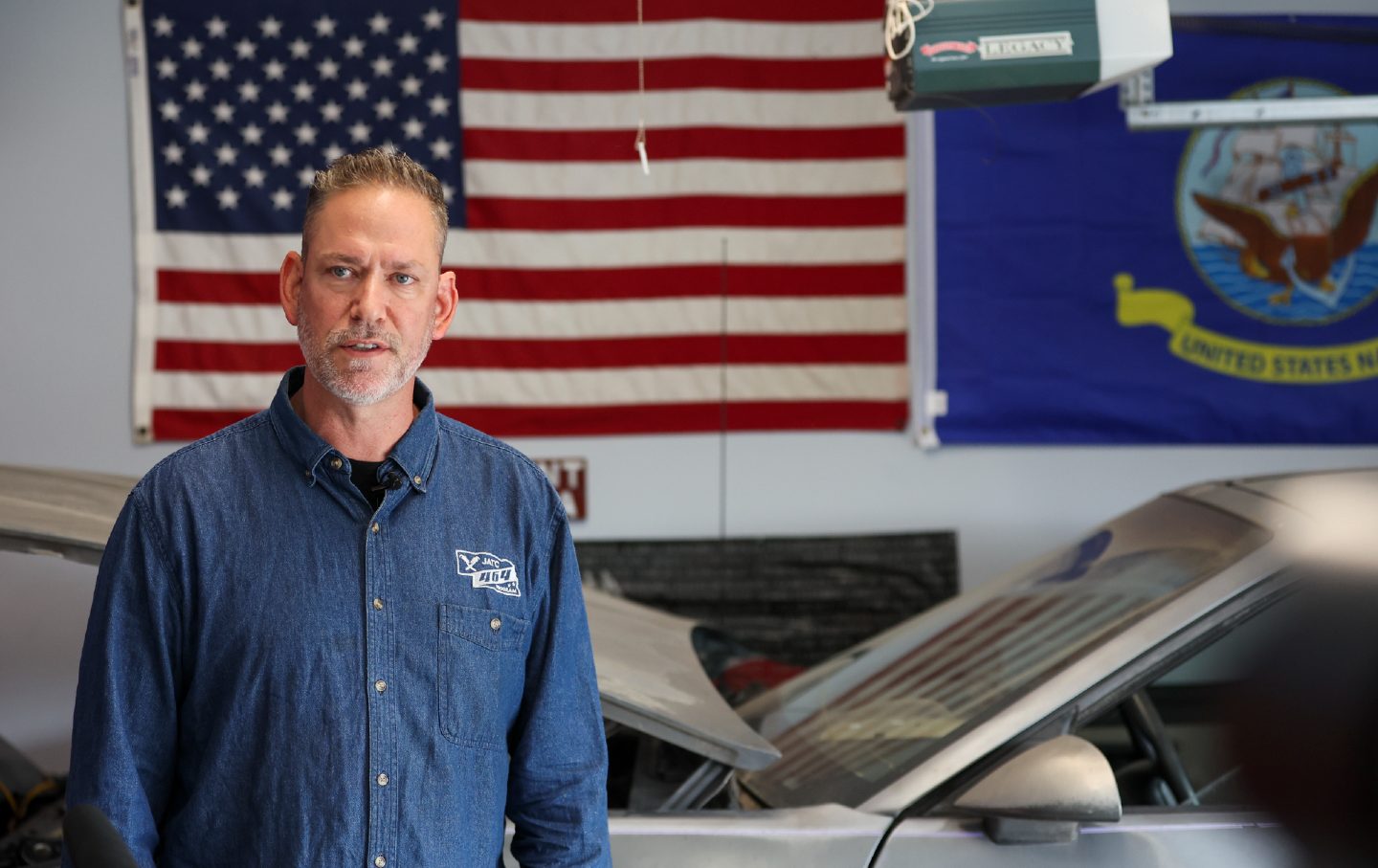[ad_1]
Politics
/
October 9, 2024
This year’s Pray Vote Stand summit revealed fissures around Trump’s refusal to support a nationwide abortion ban.

It’s Splitsville for Donald Trump and Family Research Council president Tony Perkins, picture at last year’s Pray Vote Stand summit.
(Anna Moneymaker)
Washington, DC—Tony Perkins, the clean-shaven, smooth-talking, dad-joking president of the Christian right think tank the Family Research Council (FRC), was halfway through a sentence at the group’s annual Pray Vote Stand conference on October 4 when he seemed to lose his way.
“I want to examine this moment in which we are in,” Perkins said into the tiny microphone affixed to his face, “which is a very, very…” He trailed off, gazing at the thin crowd. Perhaps he was unwilling to say what, exactly, this moment was, since what it seemed to be was a low point of Perkins’s political career. This time last year, he had presided over a bustling convention where legions of faithful lined up to watch the Republican presidential contenders jockey for the white evangelical vote. Trump had won the group’s presidential straw poll in a landslide.
This year, Trump was not just absent from the conference. He had forsaken its most precious cause, declaring just a few days earlier that he would veto any nationwide abortion ban. In July, Perkins had publicly rebuked the Republican Party for ramming through a platform he saw as soft on abortion without giving delegates like him time to weigh in, a process he decried as “unbecoming of a party that champions free speech and due process.” To cap it off, even Melania was now calling herself pro-choice. Abortion, once the glue that cemented the alliance between the Republican Party and evangelicals, was pulling them apart. Chairs sat vacant in the ice-cold ballroom, the crowd doubtless thinned by the lack of big-name speakers; even Christian right stalwart House Speaker Mike Johnson appeared only by video. I counted one person in a MAGA hat.
Finally, Perkins landed awkwardly on the assessment that this was a “very, very potential moment. I mean, it’s filled with potential.”
Then he sat on stage beside a panel of three leading pastors who stared at the floor looking like their football team had just lost and began to rally the faithful for exile.
“We’ve lost the culture war, you could say,” said the Rev. Andrew Brunson. “We’ve lost the culture and we’re a post-Christian country now.”
Current Issue

When evangelicals exploded onto the scene as a political force in the late 1970s, they did so under the banner of the Moral Majority. The movement’s name reflected its presumption that most Americans would agree with its views on abortion and homosexuality. More than 40 years later, it’s clear that these views are held only by a diminishing minority that has kept its political influence only because organizations like the FRC have assembled one of the most effective voting machines in modern history. They’ve harnessed the power of politicized churches to get the faithful to the polls, often flouting federal rules about the separation of church and state. As senior research analyst at Political Research Associates, Frederick Clarkson has noted, white evangelicals in the United States have declined in numbers in recent years but risen or at least held steady as a proportion of voters, demonstrating, he told me, that “the Christian right is the best organized faction in American politics.”
This year’s annual conclave of that faction was defined by two central paradoxes, noted People for the American Way researcher Peter Montgomery. The first was that even as speakers conveyed a sense of persecution that, Montgomery told me, “has been core to the movement’s organizing strategy since it started,” the Christian right stills control the Supreme Court—not to mention school boards, attorneys general offices, and state legislatures across America. Indeed, they are so confident in their power to impose their minority view that, as Montgomery has reported, the American Family Association’s Phillip Jauregui stood on the main stage and outlined how Republican presidents should demand that future Supreme Court justices adhere to a “biblical worldview” that, by this faction’s own admittance, represents only a tiny percentage of the population. The second paradox is that even as leaders expressed their frustration with Trump, they still pledged to vote for him.
Bunni Pounds, founder of Christians Engaged, a voter network that recently merged with FRC’s Family Policy Alliance, told me her network hopes to amass “a million Christians in the next five weeks,” doubling their current rolls. “We’ve got to reestablish the social conservative movement at the forefront of the Republican Party,” she added, looking tired.
Their best hope at reestablishing this hold is their all-out assault on trans people, a cause they hope has a better crossover appeal than same-sex marriage and abortion. In the exhibit hall, I found a booth bedecked in royal blue and Barbie pink under a sign proclaiming “Don’t Mess With Our Kids.” Founded by Jenny Donnelly, a leader in the fast-growing New Apostolic Reformation—a movement animated by the belief that Christians need to take over all levers of power including the government and schools—Don’t Mess With Our Kids was modeled on a campaign by the same name in Peru. A woman at the booth who described herself as a former member of the “lesbian lifestyle” helped me download the Her Voice MVMT app so I could join a prayer hub and state-based chat to network with women in my area. She told me how moved she was by former Minnesota representative Michele Bachmann’s remarks on Israel the night before, describing how none of Iran’s missiles had killed a single Israeli.
“Because of the missile defense system,” I said, a secular idiot’s mistake.
Because of God, the woman corrected me.
At a table nearby were stickers printed by Christians United for Israel that read, “In my Zionist era” and “Israel is family.” Israel and God’s defense of it were a main theme this year, as was abortion, which had been sidelined last year but was now back in full force, perhaps as a defensive reaction to the Republican Party’s retreat on it.
“At a time of chaos and confusion, at a time of trial that we are facing, I think it’s time that we say clearly with one voice, there is no right more important than the right to life,” Missouri Senator Josh Hawley declared to applause and cheers.
In the hall outside the ballroom, Katy Faust stood mingling with fans in a pink blouse and blazer. Raised by two moms, Faust has made a career of promoting the idea that children need a mother and father. A blond woman approached Faust and poured out a story about how her daughter “was identifying as an LBGTQ.” So the family engaged in two years of prayer and fasting while attending services at a church pastored by Gary Hamrick, a speaker at the conference who is close with Perkins, until one day the teenager told her mother that she would surrender to God. “She said within two days, the desires went away,” the woman told Faust, who congratulated her.
During her speech on stage, Faust had brought up a topic she knew would be controversial: IVF, which she said results in the destruction of more embryos each year than abortion. She knew the issue wouldn’t “get a lot of applause,” she told me, acknowledging that opposition to IVF “may not be a winning issue for a very long time.” Faust was frustrated with Trump and Republicans for “putting the finger to the wind and bending based on what’s politically convenient. I mean, that’s what they’re doing with all the life issues and that’s what they did with the marriage issue.” She liked Vance, but not the company he was keeping. “Be careful who you follow, buddy,” she said, “because your pro-life convictions certainly seemed to be sheepishly tucked away during that debate.”
That evening, in the headline spot that was reserved for Trump last year, was Jack Hibbs, who presides over a megachurch in California. Hibbs said he had called Trump after the first assassination attempt and told the former president to fall on his knees and praise God. Then he waited for Trump to comply.
“I waited; I waited,” Hibbs declared. “And don’t you think maybe that God allowed that bullet to miss his brains? That God might hear from Donald J. Trump?” But of course, Trump never had fallen on his knees. Watching Hibbs rant like a spurned lover, I was reminded of the Holy Breakup Text, Verse 8 Track 4 Album 8 Taylor Swift: I gave so many signs. So many signs. You didn’t even see the signs. Trump was a twice-divorced adulterer who referred to this crowd last year as “religious people” and couldn’t cite a Bible verse properly. Still, the faithful believed God had chosen him and then saved him from the assassin’s bullet. It was now clear that Trump had not reciprocated God’s feelings. You were my crown, now I’m in exile seeing you out.
“I’m going to be voting for Trump. There’s no doubt about that,” Hibbs declared. “Here’s the thing: I’m not happy about it.”
“Preach it!” someone yelled from the back.
Popular
“swipe left below to view more authors”Swipe →
When Hibbs continued: “Let’s be honest: The Republican Party ain’t that far away from the Democrat Party these days,” I picked up my phone and texted my husband: “Trump is going to lose.” Because if the leaders were this mad, a certain number of rank-and-file faithful were going to stay home, if not vote for a third party.
There was in fact a third-party option parked outside in a 2008 Fleetwood Excursion tour bus with Destroy the Democrat Party written on the side. Randall Terry, the former leader of the militant anti-abortion organization Operation Rescue, whose followers blockaded clinics by the thousands in the late 1980s and early ’90s, sat inside the bus wearing a tie over black jeans and pointed leather boots, railing against the “grifters” at the conference who had refused to let him register and then dispatched a security guard to warn him to stay away. Terry is running for president on the ultraconservative Constitution Party’s ticket, in part so he can run graphic anti-abortion ads, which he argues will not only spread his anti-abortion message but might lure away enough Catholic Democrats to help Trump win. He and his running mate, pastor Stephen Broden, have made the ballot in 12 states. Maybe they’d been kicked out of the conference because Broden had approached Perkins with a video crew in tow the night before to ask him to support their campaign, while Terry had confronted Gary Hamrick over his refusal to let the campaign gather signatures in his church parking lot. Or maybe it was because Terry’s very presence there was evidence of the contradiction that may define the Christian right’s moment in exile: Like Trump, the “grifters” had been willing to compromise for political expediency. In Terry, they had a purer anti-abortion alternative, but they would not risk taking it. They would stand by the Republican Party even if it didn’t stand by them. Because if there was any potential in this moment it was this: If Trump were reelected, the exile, they hoped, would be temporary.
Can we count on you?
In the coming election, the fate of our democracy and fundamental civil rights are on the ballot. The conservative architects of Project 2025 are scheming to institutionalize Donald Trump’s authoritarian vision across all levels of government if he should win.
We’ve already seen events that fill us with both dread and cautious optimism—throughout it all, The Nation has been a bulwark against misinformation and an advocate for bold, principled perspectives. Our dedicated writers have sat down with Kamala Harris and Bernie Sanders for interviews, unpacked the shallow right-wing populist appeals of J.D. Vance, and debated the pathway for a Democratic victory in November.
Stories like these and the one you just read are vital at this critical juncture in our country’s history. Now more than ever, we need clear-eyed and deeply reported independent journalism to make sense of the headlines and sort fact from fiction. Donate today and join our 160-year legacy of speaking truth to power and uplifting the voices of grassroots advocates.
Throughout 2024 and what is likely the defining election of our lifetimes, we need your support to continue publishing the insightful journalism you rely on.
Thank you,
The Editors of The Nation
More from The Nation

He relished the limelight in 2016 and 2020. Now he’s refusing to debate and ducking interviews.
John Nichols

The former president, who turned 100 on October 1, and is in hospice care, said he is “only trying to make it to vote for Kamala Harris,” according to his grandson, Jason Carter.
OppArt
/
Colleen Quinn

Democrat or Republican, the next presidency will still mean death for others in faraway places.
Ahmed Moor

MAGA partisans, including Donald Trump and Elon Musk, have unleashed their own flood of disinformation regarding the federal emergency response.
Chris Lehmann

He knows the breadbasket of the country and has a record of helping working people put food on the table.
Katrina vanden Heuvel

